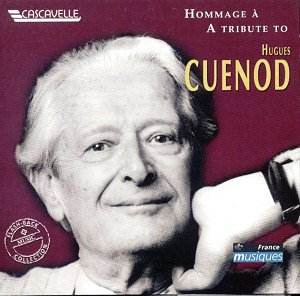Cascavelle has a good
track record for reissues of great French
artists, of whom a goodly number were
actually Swiss by birth. Such was the
case with Hugues Cuenod whose recordings
here range from his pioneering work
of Couperin, through his rewarding experience
with Stravinsky’s Cantate, the
Mozart Masonic Music and as a bon
bouche a sliver of his Delannoy
to bring him, and us, up-to-date.
Though he became more
known for his longevity then his pioneering
work on disc Cuenod was part of that
generation of musicians to rediscover
their musical heritage in the 1930s.
Jane Evrard was one such pioneer, indeed
she directs the 1936 Troisième
Leçon of Couperin, though
of course Nadia Boulanger’s Monteverdi
discs (on which Cuenod sang) were very
much better known internationally. Cuenod
returned to Couperin after the war by
recording the Première Leçon
in Boston in 1950 and adding the Trois
Chansons and the Audite Omnes
et Expanescite.
The earlier recording
under Evrard however represents real
archaeology. Cuenod impresses with his
characteristic high tenor – light, elegant,
focused, and capable of mezza voce and
half voice of great purity. It’s a voice
well known and loved at Glyndebourne
and to its agility we can add the quality
of fine diction. The two-soprano vocalise
in the Jad, Caph and Lamed
is an exquisite feature of this performance
– they’re unnamed choir members but
sing with expressive purity – and throughout
one senses Evrard’s control and the
fresh sincerity of the music making.
By 1950 the recording set up had moved
to America where the sound is rather
pinched though the performances no less
pioneering. Certainly his is a highly
distinctive voice and in the Plorans
there’s a strong hint of a bleat – and
critical listeners may also bridle at
the very large-sounding harpsichord
wielded by Daniel Pinkham, not exactly
a Landowska Pleyel but not a model of
agility either. Cuenod’s recitatives
here take on real life and the voice
itself comes close to that of a counter-tenor
on more than a few occasions, at which
point it can sound rather unsupported.
The Trois Chansons are idyllically
done – with an impressive and long harpsichord
postlude in La Pastorelle - whilst
Audite Omnes et Expanescite has
a small instrumental ensemble supporting
Cuenod, whose wealth of warming colours
are a constant delight.
Stravinsky’s Cantate
was a work much associated with Cuenod
and indeed with Jennie Tourel who sings
in this 1952 Columbia under the composer’s
direction. The choir sounds highly disciplined
under the experienced direction of Margaret
Hillis, one of America’s leading choral
directors, and one can measure this
recording against the later, rather
better known one also directed by Stravinsky.
In the Ricercare II Tomorrow Shall
Be My Dancing Day we can hear Cuenod’s
unearthly high tenor to its best advantage
as indeed one can in his duet with Tourel
in Weston Wind.
Not all of the Masonic
Music is desperately captivating but
quite a bit is. There’s a small band
but the chorus is not of the finest.
There’s also rather more hiss here than
in the other tracks and a rather steely
quality which makes me wonder about
the transfer, as steel is not a quality
one associates with Cuenod’s Mozart
– pliancy, yes, elegance too, but not
steel. . His light legato is candidly
deployed in O heiliges Band K148/125h,
for all that this lasts barely a minute,
and he’s joined by the young Souzay
later on. Finally there is the Delannoy
pendant. It’s forgotten now but Cuenod
sang Noel Coward, acted on Broadway
in 1929 and performed cabaret with Mireille.
It was only much later that he became
so identified with Mozart, Stravinsky,
the Bach Passions and Schutz. One can
hear the immediate suavity of the voice
in this extract quite unlike anything
we have heard from him timbrally in
the strictly classical repertoire. The
voice is still light though – and he
whistles as every good boulevardier
should. Total delight.
The notes are really
just a few brief paragraphs of quotations
from Cuenod down the years. No texts,
unfortunately. In the main these are
trusty transfers, the odd hit and miss
side join apart; Cuenod will give lasting
pleasure and reward, as he always did.
Jonathan Woolf


